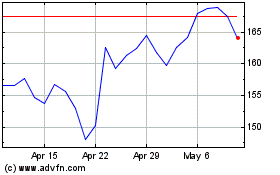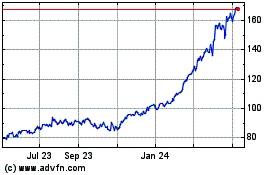By Thomas Gryta
This article is being republished as part of our daily
reproduction of WSJ.com articles that also appeared in the U.S.
print edition of The Wall Street Journal (July 22, 2017).
General Electric Co., a company in transition that also is
changing its CEO, told investors Friday that they would have to
wait four months to hear the new boss's strategy for boosting
results.
GE investors, who have missed out on the broader stock market's
rally, were in no mood to be patient. Shares of the Boston-based
conglomerate fell nearly 3%, leaving the stock 18% below where it
started the year.
GE, its profits under pressure, improved its cash flow and
ramped up cost-cutting efforts -- two areas of investor concern --
in Chief Executive Jeff Immelt's last quarter at the helm. The bad
news from investors' point of view was that GE tempered profit
expectations for the current year and said investors would have to
wait until mid-November for CEO-designate John Flannery to discuss
the outlook for 2018.
It is unusual for a big company, especially one such as GE that
is being pressured by an activist investor to improve its
performance, to ask shareholders and customers to wait so long to
learn about its game plan.
"This is a strange situation," said Nicholas Heymann, an analyst
with William Blair & Co. "This increases the duration of the
period of uncertainty."
On a conference call Friday, analyst Deane Dray of RBC Capital
Markets asked if GE would be in "limbo" until November. Mr.
Flannery said the financial framework for 2017 is set and that he
is "not worried that we're going to be, you know, dead in the water
in the meantime."
Mr. Immelt will step down at the end of this month after 16
years as CEO.
GE is under increasing pressure to show that its pivot away from
financial services, big bets on the oil industry and a renewed
focus on making jet engines and power turbines would be good for
investors.
Shares fell 2.9% to $25.91 each in Friday trading.
Mr. Flannery, who formerly ran GE's health-care unit, is meeting
with small groups of investors and visiting the business units of
the roughly 300,000-person company.
Jeffrey Bornstein, GE's chief financial officer, defended the
timeline in an interview and said the company would have to "play
through" any uncertainty created by a review that includes "testing
everything we believe."
"The notion that [Mr. Flannery] is going to get his arms around
this in a month is a fallacy," Mr. Bornstein said in an interview.
"I don't think asking for four or five months to do this is asking
a lot."
On Friday, GE backed its prior 2017 projection of earnings of
$1.60 to $1.70 a share and organic sales growth of 3% to 5%, but it
warned that profit would be on the weak side. "Given our outlook on
oil and gas and power, we are trending to the bottom end of the
range," Mr. Bornstein said on the conference call.
Analysts are skeptical that GE will reach a goal of delivering
$2 a share in profit in 2018, but the company said an updated
target wouldn't come until after Mr. Flannery's review.
"This was almost like a funeral dirge today. There was nothing
positive, " said Brian Langenberg, industry strategist at
Langenberg & Co. "I can't think of anything in November that is
going to make me thrilled."
Also Friday, industrial conglomerate Honeywell International
Inc. reported a stronger quarterly profit and raised the low end of
its 2017 earnings outlook. The company is also conducting a review
of its portfolio under new CEO Darius Adamczyk which it expects to
complete in late September or early October.
"We are very conscious of not letting this slow us down," said
Chief Financial Officer Tom Szlosek in an interview. "We think we
do a good job of keeping our businesses out of it."
Strength in its aerospace division as well as its home and
building-technologies business helped Honeywell's latest results.
The company's profit rose 6% to $1.4 billion in the second quarter,
while revenue climbed about 1% to $10.08 billion.
Honeywell shares gained 1% to $136.35 Friday, leaving it up 18%
for the year.
Both GE and Honeywell are facing pressure from activist
investors. GE pledged to boost its cost-cutting program earlier
this year after discussions with Trian Fund Management LP, which
has been frustrated by missed profit goals at GE. Third Point LLC
has called on Honeywell to explore selling or splitting off its
aerospace business.
On Friday, GE said it cut $593 million in annual industrial
costs in the second quarter and is on track to meet or beat its $1
billion savings goal by the end of the year. It has eliminated $670
million in spending this year.
Despite re-examining its spending, GE said it won't consider
reducing its dividend payout, which Mr. Bornstein called the
company's "single most important capital allocation item."
Cash flow in GE's industrial segment was a positive $1.5 billion
after a shocking negative $1.6 billion for the first quarter. The
company backed its full-year cash-flow target of $12 billion to $14
billion but said it would also be at the low end of the projected
range.
In all, GE's second-quarter earnings fell less than expected,
with much of the drop reflecting a year-earlier boost from the sale
of its home-appliances business. The company reported a profit of
$1.19 billion, or 15 cents a share, down from $2.76 billion, or 36
cents a share, a year earlier. Revenue fell 12% to $29.56
billion.
Imani Moise contributed to this article.
Write to Thomas Gryta at thomas.gryta@wsj.com
(END) Dow Jones Newswires
July 22, 2017 02:47 ET (06:47 GMT)
Copyright (c) 2017 Dow Jones & Company, Inc.
GE Aerospace (NYSE:GE)
Historical Stock Chart
From Aug 2024 to Sep 2024

GE Aerospace (NYSE:GE)
Historical Stock Chart
From Sep 2023 to Sep 2024
